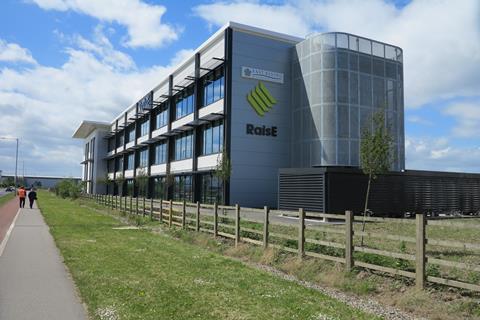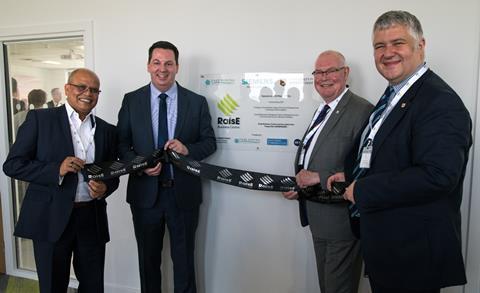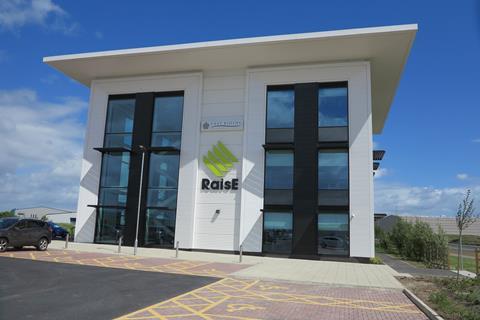
UK: The Rail Accelerator & Innovation Solutions hub for Enterprise in Goole has been formally inaugurated, adjacent to the new Siemens Mobility rolling stock assembly plant which is now nearing completion.
RaisE is being developed by a partnership of East Riding of Yorkshire Council, Siemens Mobility and the Birmingham Centre for Railway Research & Education.

It was opened on May 27 by the MP for Brigg & Goole Andrew Piercy, along with the UK Head of Rolling Stock at Siemens Mobility Sambit Banerjee and Prof Clive Roberts, who leads the School of Engineering at the University of Birmingham.
Speaking at the launch, ERYC leader Councillor Jonathan Owen explained that the facility in the Goole 36 enterprise zone was the ninth such business centre to be developed by the council in co-operation with industrial and academic partners from different sectors.
Planning began in 2018. Funding for the £8·1m project included £1·5m from the European Regional Development Fund and £1m from the Getting Building Fund, via the Hull & East Riding Local Enterprise Partnership.
Envisaged as the ‘beating heart’ of an emerging Goole Rail Village, RaisE is intended to house small and medium enterprises in the supply chain for the Siemens Mobility plant, as well as companies looking to diversify into the UK rail sector.
Built by local contractor Willmot Dixon, the building provides 3 200 m2 of floor space including 30 office suites and workshop accommodation, as well as conference and meeting rooms and a café to serve the business park. Six tenants have already reserved space, with more to be confirmed shortly.
The investment in both RaisE and Siemens’ £200m assembly plant would put Goole ‘on the global map for innovation and development’, said Banerjee, commenting that ‘the UK is a global front runner for digitalisation in the rail industry’. Adding that ‘Siemens is a company that believes in innovation’, he warned that success depended on having an openness to accept mistakes. ‘You might make three mistakes in row, but the fourth could turn out to be the game changer’.
Second phase planned

Speaking to Rail Business UK, Roberts explained that the business centre was only ‘the first step in the chain’, and the partners were now developing plans for Phase II of RaisE. This would see the construction of a dedicated research and development facility at an anticipated cost of around £50m.
Emphasising that ‘we need to accelerate UK innovation’ in the rail sector, he said RaisE would bring together academic research, the supply chain and ‘big industry players like Siemens’ to develop, test and industrialise new technologies. He anticipated that the Goole facility would bring together many different activities ‘under one roof’, but would also work closely with other sites.
This could include the Global Centre of Rail Excellence at Onllwyn in south Wales which due to open in 2025; the University of Birmingham is a Welsh government partner for R&D.
Roberts suggested that Phase II of RaisE was likely to be funded through a second phase of the UK Rail Research & Innovation Network. This public-private partnership initially raised £92m to support rail R&D, of which two-thirds was provided by industry and one-third by the public sector, and he anticipated that the next round would be similar.
Birmingham is one of three Centres of Excellence for UKRRIN, leading on digital systems, while infrastructure is headed by the University of Southampton and rolling stock by the University of Huddersfield.
Reporting that 12 more universities and eight companies had joined UKRIIN since it was established, Roberts said these included the University of Hull, which would be well placed to support the developments at Goole. He emphasised that the group had an ‘open door attitude’, and would welcome more partners, particularly where they could bring additional capabilities and ‘fill gaps’.
Although UK organisations had played an active role in pan-European research through the Shift2Rail programme, he admitted that there were still many uncertainties over future involvement following Brexit. Nevertheless, there was plenty of opportunity to inculcate ‘a UK innovation culture’, he felt. Among priorities, he cited the need to develop a strategy for rolling out ERTMS across the UK rail network.
- Siemens Mobility insiders have confirmed to Rail Business UK that the company is looking at the scope to incorporate a short test track within the Goole plant, alongside the production and commissioning buildings where it will assemble articulated nine-car trainsets for London Underground’s Piccadilly Line.



